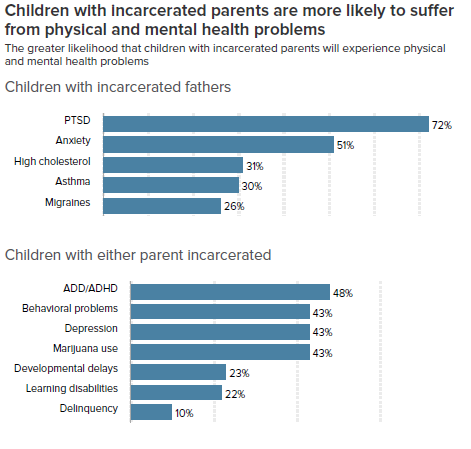Criminal justice reform is important not just for adults but also for children, as highlighted in a new report from the Economic Policy Institute (EPI). This link is especially relevant in Kentucky given the large share of children with a parent who has been incarcerated as well as opportunity to make needed changes given the momentum around criminal justice reform in our state. If fewer parents are incarcerated — particularly to serve very long sentences — their kids could see improvements in education, better health and more economic opportunities, the report suggests.
Improvement in School
Reforming Kentucky’s criminal justice system in ways that reduce incarceration could improve kids’ performance in school. Children of incarcerated parents are more likely to:
- Have speech or language problems than children whose fathers have not been incarcerated (33 percent more likely).
- Experience grade point average declines.
- Drop out of school at a higher rate. This is particularly true for adolescent boys with an incarcerated mother, who are 25 percent more likely to drop out and 55 percent more likely to drop out because they themselves have been incarcerated.
- Complete fewer years of school if they have an incarcerated father than children of non-incarcerated fathers.
- Develop a learning disability. Children of incarcerated parents are 48 percent more likely to be diagnosed with ADHD, 23 percent more likely to experience developmental delays and 43 percent more likely to suffer from behavioral problems.
Better Health
Research also shows children of incarcerated fathers have worse physical and mental health. As seen in the chart below from the report, children of incarcerated fathers are more likely to:
- Suffer from migraines, asthma and high cholesterol.
- Experience anxiety, depression and post-traumatic stress disorder.
Source: Leila Morsy and Richard Rothstein, “Mass Incarceration and Children’s Outcomes,” Economic Policy Institute, December 15, 2016, http://www.epi.org/files/pdf/118615.pdf.
Children with incarcerated parents are also more likely to:
- Have a higher body mass index as an adult, if they are female, which is associated with such health problems as heart disease and diabetes.
More Economic Opportunities
In addition, children of incarcerated parents are more likely to experience economic instability and to become poor. Economic problems stem from the loss of a parent’s income — often the primary provider in the family — during incarceration as well as incarcerated parents’ difficulty finding a job after release with a criminal record. According to the report, “Income losses from incarceration and exclusion from post-incarceration employment cause multigenerational harm, because income mobility is rare.”
In addition, children of incarcerated parents are more likely to engage in behavior that exposes them to the criminal justice system, to end up in foster care if they have an incarcerated parent and to become homeless.
Given the fact there are racial and social class differences in children’s experiences with parental incarceration, at the national level African American children are more likely to experience these negative impacts — and also benefit from criminal justice reforms. We have previously described the racial disparities that also exist in Kentucky’s criminal justice system. The new report suggests criminal justice reforms could be a way to help address achievement gaps like those that exist in Kentucky between African American and white children.
If Kentucky passes criminal justice reforms in 2017 that make a meaningful change in incarceration and recidivism rates — including through the efforts of the state’s Criminal Justice Policy Assessment Council (CJPAC) — it could make a big difference in the lives of Kentucky kids.



